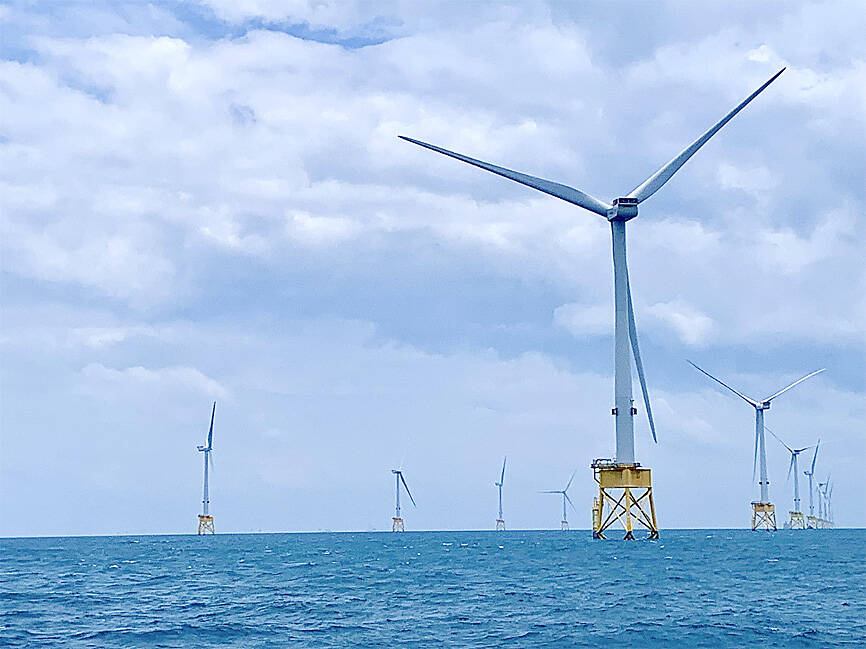Google has signed an agreement with Copenhagen Infrastructure Partners K/S (CIP) to buy electricity from the Danish firm’s wind farm off Taichung, CIP said in a statement yesterday.
Through its fifth flagship fund, Copenhagen Infrastructure V, CIP and Google last month signed a corporate power purchase agreement to buy power from CIP’s Fengmiao I (渢妙一期) offshore wind project.
It is the first agreement Google has made to buy offshore energy in Taiwan as well as in the Asia-Pacific region, CIP said.

Photo: CNA
Located about 35km off Taichung, the Fengmiao I project secured site exclusivity and 500-megawatt (MW) grid capacity in Taiwan’s Round 3.1 auction and is the first of Taiwan’s Round 3 Offshore Wind Zonal Development projects to reach financial close, as well as start construction.
Giorgio Fortunato, head of clean energy and power for Asia Pacific at Google, said in the statement that the agreement with CIP represented a new chapter for the tech company, as the project would provide reliable electricity to support the firm’s data center, cloud region and offices in Taiwan.
It also represented an integration of offshore wind energy development in Taiwan and Google’s clean energy efforts, Fortunato said.
Fengmiao I is to build 33 units of CIP’s latest 15MW turbines, CIP said, adding that the project is scheduled to be completed by the end of 2027.
Fengmiao I — which has secured about NT$103 billion (US$3.17 billion) in financing from 27 international and Taiwanese banks and is gearing up to push for construction — is CIP’s most recent offshore wind project in Taiwan, after the construction of the Changfang (彰芳), Xidao (西島) and Zhongneng (中能) wind farms off Changhua County.
Thomas Wibe Poulsen, partner and head of Asia Pacific at CIP, said the agreement with Google regarding the Fengmiao I project was the second power purchasing agreement between the two sides.
In December last year, through CIP’s Energy Transition Fund, the two companies signed an agreement to buy renewable energy generated by the Zeevonk project in the Netherlands.
While tapping offshore wind energy in Taiwan, Google last week announced that it had signed a geothermal power purchase agreement with Baseload Power Taiwan Inc (台灣倍速羅得) to support clean energy development — its first such deal in the Asia-Pacific region.
Taiwan’s access to “substantial geothermal resources” could complement other renewable sources such as solar and wind, given the “significant potential” for using underground heat to generate clean electricity, Google said.

GROWING OWINGS: While Luxembourg and China swapped the top three spots, the US continued to be the largest exposure for Taiwan for the 41st consecutive quarter The US remained the largest debtor nation to Taiwan’s banking sector for the 41st consecutive quarter at the end of September, after local banks’ exposure to the US market rose more than 2 percent from three months earlier, the central bank said. Exposure to the US increased to US$198.896 billion, up US$4.026 billion, or 2.07 percent, from US$194.87 billion in the previous quarter, data released by the central bank showed on Friday. Of the increase, about US$1.4 billion came from banks’ investments in securitized products and interbank loans in the US, while another US$2.6 billion stemmed from trust assets, including mutual funds,

Micron Memory Taiwan Co (台灣美光), a subsidiary of US memorychip maker Micron Technology Inc, has been granted a NT$4.7 billion (US$149.5 million) subsidy under the Ministry of Economic Affairs A+ Corporate Innovation and R&D Enhancement program, the ministry said yesterday. The US memorychip maker’s program aims to back the development of high-performance and high-bandwidth memory chips with a total budget of NT$11.75 billion, the ministry said. Aside from the government funding, Micron is to inject the remaining investment of NT$7.06 billion as the company applied to participate the government’s Global Innovation Partnership Program to deepen technology cooperation, a ministry official told the

Taiwan Semiconductor Manufacturing Co (TSMC, 台積電), the world’s leading advanced chipmaker, officially began volume production of its 2-nanometer chips in the fourth quarter of this year, according to a recent update on the company’s Web site. The low-key announcement confirms that TSMC, the go-to chipmaker for artificial intelligence (AI) hardware providers Nvidia Corp and iPhone maker Apple Inc, met its original roadmap for the next-generation technology. Production is currently centered at Fab 22 in Kaohsiung, utilizing the company’s first-generation nanosheet transistor technology. The new architecture achieves “full-node strides in performance and power consumption,” TSMC said. The company described the 2nm process as

POTENTIAL demand: Tesla’s chance of reclaiming its leadership in EVs seems uncertain, but breakthrough in full self-driving could help boost sales, an analyst said Chinese auto giant BYD Co (比亞迪) is poised to surpass Tesla Inc as the world’s biggest electric vehicle (EV) company in annual sales. The two groups are expected to soon publish their final figures for this year, and based on sales data so far this year, there is almost no chance the US company led by CEO Elon Musk would retain its leadership position. As of the end of last month, BYD, which also produces hybrid vehicles, had sold 2.07 million EVs. Tesla, for its part, had sold 1.22 million by the end of September. Tesla’s September figures included a one-time boost in